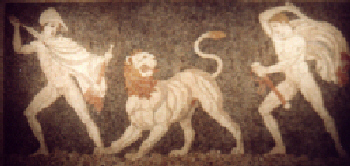Journey through Ancient Greece
Itinerary: North Eastern Greece4 nights in Thessaloniki and 4 nights in Kavala,

Pebble mosaic at Pella,
|
Pebble mosaic at Pella, |
 Turkish bath house in Thessaloníki |
The North has a distinct character, landscape and history making it a quite different experience to the Peloponnese. The different climate (wetter!) means the area is altogether greener, the land more cultivated, with fruit trees more common than olives. |
|
The sanctuary of Isis at Dion, |
|
Then we travel east to Amphipolis. Founded in 437 BC Amphipolis this is another very large site with remains from the C5th BC, including unique remnants of the bridge over the river Strymon, some 10 kilometres of defensive walls, the painted walls of a Hellenistic house, and several Byzantine Basilicas. Nearby is the magnificent C4th BC colossal marble Lion of Amphipolis. |
lead roof of the Imaret in Kavala |
The Roman Forum at Philipi |
From here we visit Philipi, site of the battle in 42 BC. Most of the extensive remains we see are Roman & Christian, including part of the original Via Egnatia, a fine theatre, a forum, public baths, three basilicas & what may have been St Paul's prison. |
The Agora in Limenas, Thasos |
We will make a day trip to Liménas, the capital of Thasos, a short ferry ride away, where there is an ancient akropolis, theatre, agora, remains of several sanctuaries and good beaches. |